Analysis of Woolworths Sales Decline and Organizational Theories
VerifiedAdded on 2022/09/18
|9
|2689
|22
Report
AI Summary
This report examines the sales decline of Woolworths Group Limited, attributing it to factors such as aggressive competitor promotions and internal organizational issues. It explores the application of organizational culture and institutional theory to understand the company's challenges. The report analyzes the impact of organizational culture on employee performance, communication, and leadership, highlighting the lack of a clear vision and accountability. It also discusses how institutional theory can be used to address sustainability within the supply chain, considering the health implications of Woolworths' product offerings. The report concludes by acknowledging the limitations of the organizational culture and institutional theories and suggests lessons that a manager can learn from the Woolworths case.
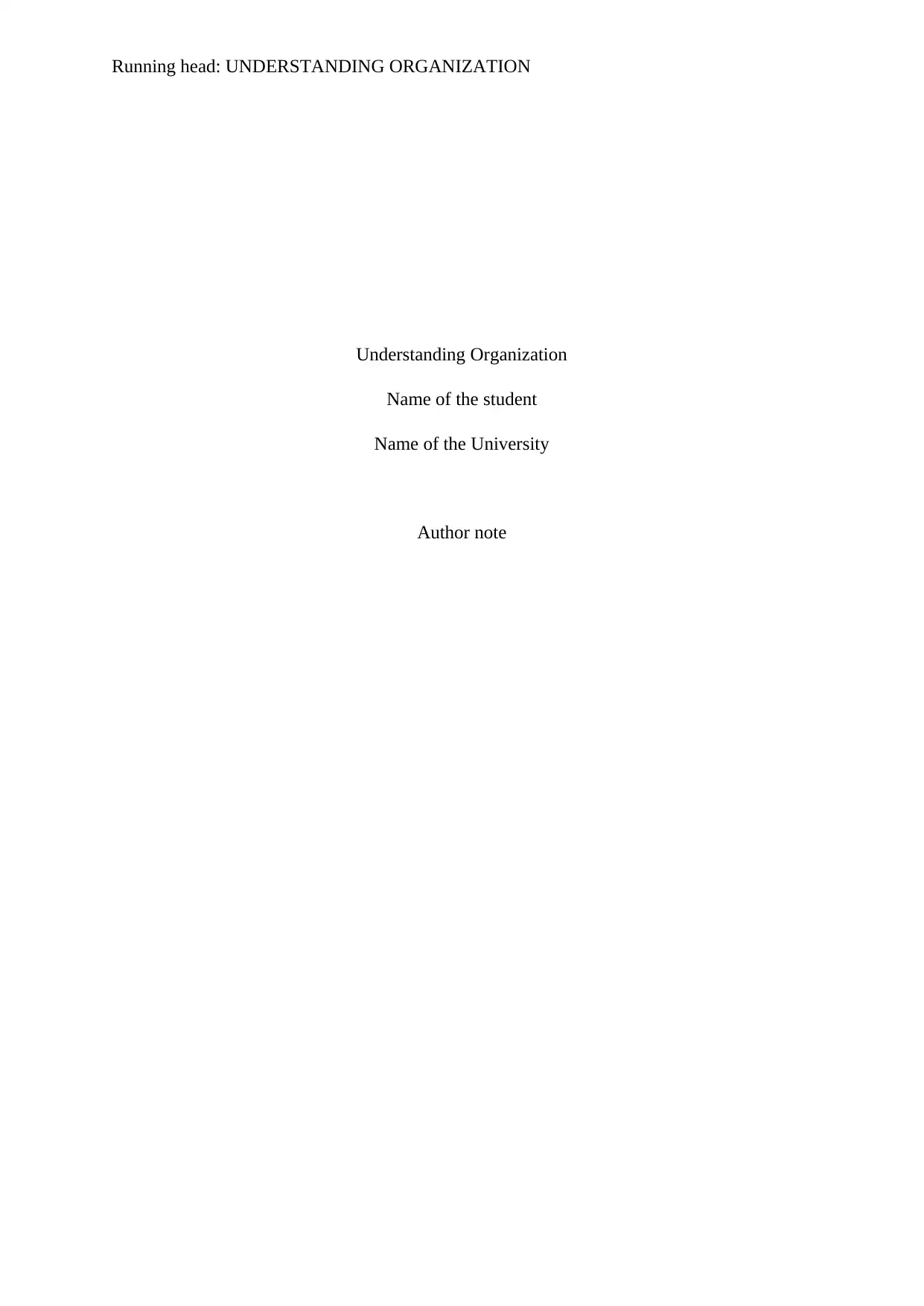
Running head: UNDERSTANDING ORGANIZATION
Understanding Organization
Name of the student
Name of the University
Author note
Understanding Organization
Name of the student
Name of the University
Author note
Paraphrase This Document
Need a fresh take? Get an instant paraphrase of this document with our AI Paraphraser
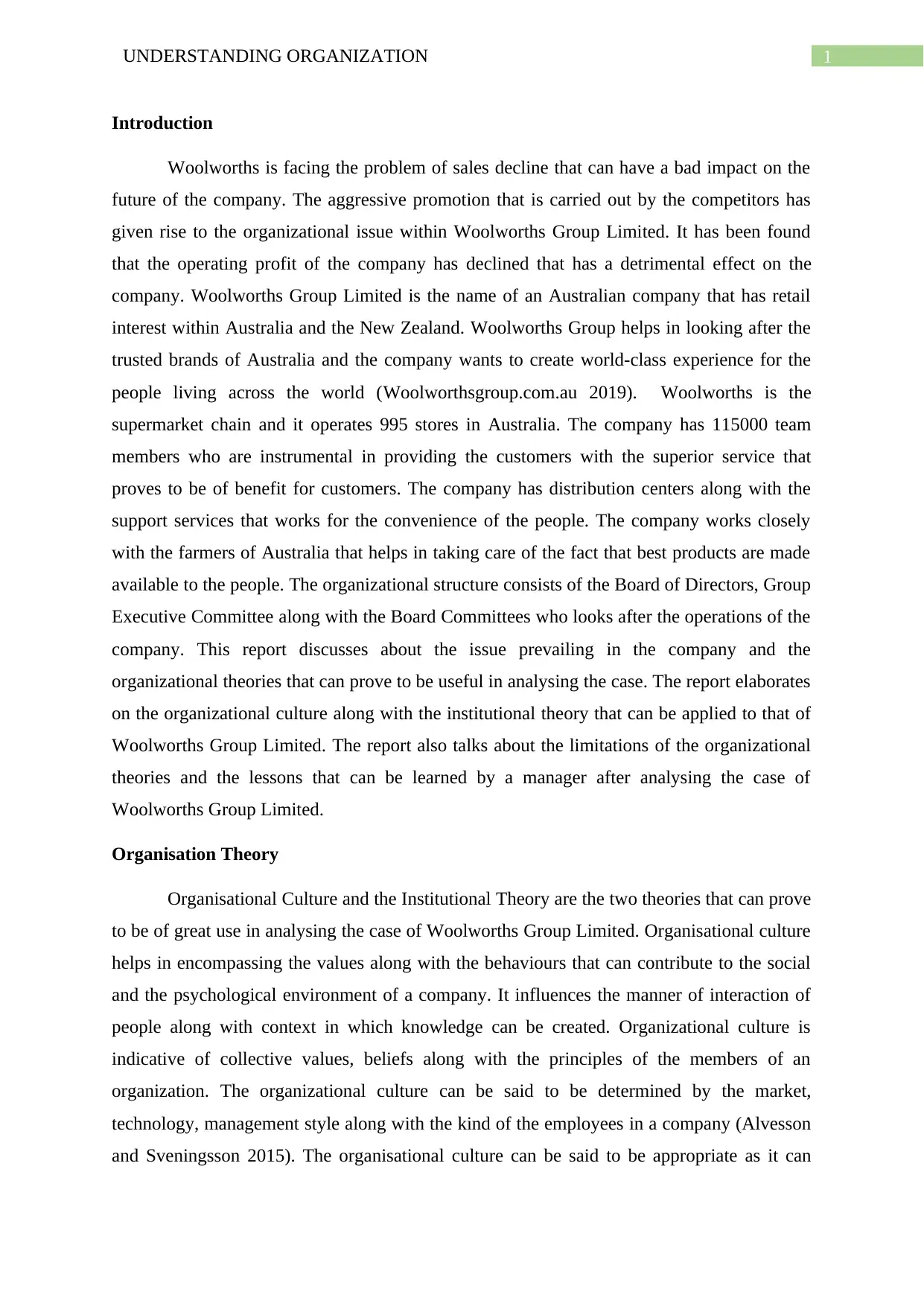
1UNDERSTANDING ORGANIZATION
Introduction
Woolworths is facing the problem of sales decline that can have a bad impact on the
future of the company. The aggressive promotion that is carried out by the competitors has
given rise to the organizational issue within Woolworths Group Limited. It has been found
that the operating profit of the company has declined that has a detrimental effect on the
company. Woolworths Group Limited is the name of an Australian company that has retail
interest within Australia and the New Zealand. Woolworths Group helps in looking after the
trusted brands of Australia and the company wants to create world-class experience for the
people living across the world (Woolworthsgroup.com.au 2019). Woolworths is the
supermarket chain and it operates 995 stores in Australia. The company has 115000 team
members who are instrumental in providing the customers with the superior service that
proves to be of benefit for customers. The company has distribution centers along with the
support services that works for the convenience of the people. The company works closely
with the farmers of Australia that helps in taking care of the fact that best products are made
available to the people. The organizational structure consists of the Board of Directors, Group
Executive Committee along with the Board Committees who looks after the operations of the
company. This report discusses about the issue prevailing in the company and the
organizational theories that can prove to be useful in analysing the case. The report elaborates
on the organizational culture along with the institutional theory that can be applied to that of
Woolworths Group Limited. The report also talks about the limitations of the organizational
theories and the lessons that can be learned by a manager after analysing the case of
Woolworths Group Limited.
Organisation Theory
Organisational Culture and the Institutional Theory are the two theories that can prove
to be of great use in analysing the case of Woolworths Group Limited. Organisational culture
helps in encompassing the values along with the behaviours that can contribute to the social
and the psychological environment of a company. It influences the manner of interaction of
people along with context in which knowledge can be created. Organizational culture is
indicative of collective values, beliefs along with the principles of the members of an
organization. The organizational culture can be said to be determined by the market,
technology, management style along with the kind of the employees in a company (Alvesson
and Sveningsson 2015). The organisational culture can be said to be appropriate as it can
Introduction
Woolworths is facing the problem of sales decline that can have a bad impact on the
future of the company. The aggressive promotion that is carried out by the competitors has
given rise to the organizational issue within Woolworths Group Limited. It has been found
that the operating profit of the company has declined that has a detrimental effect on the
company. Woolworths Group Limited is the name of an Australian company that has retail
interest within Australia and the New Zealand. Woolworths Group helps in looking after the
trusted brands of Australia and the company wants to create world-class experience for the
people living across the world (Woolworthsgroup.com.au 2019). Woolworths is the
supermarket chain and it operates 995 stores in Australia. The company has 115000 team
members who are instrumental in providing the customers with the superior service that
proves to be of benefit for customers. The company has distribution centers along with the
support services that works for the convenience of the people. The company works closely
with the farmers of Australia that helps in taking care of the fact that best products are made
available to the people. The organizational structure consists of the Board of Directors, Group
Executive Committee along with the Board Committees who looks after the operations of the
company. This report discusses about the issue prevailing in the company and the
organizational theories that can prove to be useful in analysing the case. The report elaborates
on the organizational culture along with the institutional theory that can be applied to that of
Woolworths Group Limited. The report also talks about the limitations of the organizational
theories and the lessons that can be learned by a manager after analysing the case of
Woolworths Group Limited.
Organisation Theory
Organisational Culture and the Institutional Theory are the two theories that can prove
to be of great use in analysing the case of Woolworths Group Limited. Organisational culture
helps in encompassing the values along with the behaviours that can contribute to the social
and the psychological environment of a company. It influences the manner of interaction of
people along with context in which knowledge can be created. Organizational culture is
indicative of collective values, beliefs along with the principles of the members of an
organization. The organizational culture can be said to be determined by the market,
technology, management style along with the kind of the employees in a company (Alvesson
and Sveningsson 2015). The organisational culture can be said to be appropriate as it can
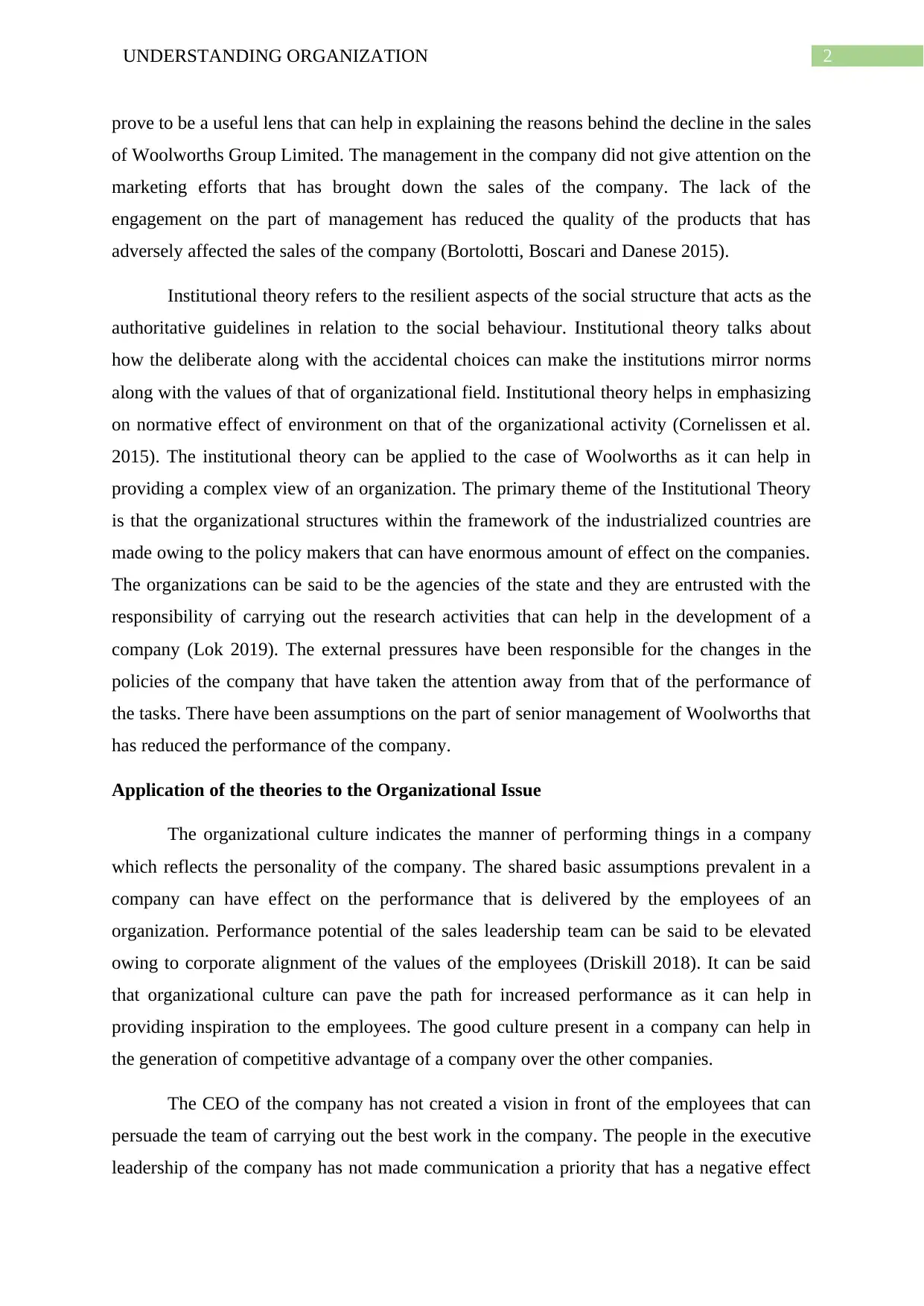
2UNDERSTANDING ORGANIZATION
prove to be a useful lens that can help in explaining the reasons behind the decline in the sales
of Woolworths Group Limited. The management in the company did not give attention on the
marketing efforts that has brought down the sales of the company. The lack of the
engagement on the part of management has reduced the quality of the products that has
adversely affected the sales of the company (Bortolotti, Boscari and Danese 2015).
Institutional theory refers to the resilient aspects of the social structure that acts as the
authoritative guidelines in relation to the social behaviour. Institutional theory talks about
how the deliberate along with the accidental choices can make the institutions mirror norms
along with the values of that of organizational field. Institutional theory helps in emphasizing
on normative effect of environment on that of the organizational activity (Cornelissen et al.
2015). The institutional theory can be applied to the case of Woolworths as it can help in
providing a complex view of an organization. The primary theme of the Institutional Theory
is that the organizational structures within the framework of the industrialized countries are
made owing to the policy makers that can have enormous amount of effect on the companies.
The organizations can be said to be the agencies of the state and they are entrusted with the
responsibility of carrying out the research activities that can help in the development of a
company (Lok 2019). The external pressures have been responsible for the changes in the
policies of the company that have taken the attention away from that of the performance of
the tasks. There have been assumptions on the part of senior management of Woolworths that
has reduced the performance of the company.
Application of the theories to the Organizational Issue
The organizational culture indicates the manner of performing things in a company
which reflects the personality of the company. The shared basic assumptions prevalent in a
company can have effect on the performance that is delivered by the employees of an
organization. Performance potential of the sales leadership team can be said to be elevated
owing to corporate alignment of the values of the employees (Driskill 2018). It can be said
that organizational culture can pave the path for increased performance as it can help in
providing inspiration to the employees. The good culture present in a company can help in
the generation of competitive advantage of a company over the other companies.
The CEO of the company has not created a vision in front of the employees that can
persuade the team of carrying out the best work in the company. The people in the executive
leadership of the company has not made communication a priority that has a negative effect
prove to be a useful lens that can help in explaining the reasons behind the decline in the sales
of Woolworths Group Limited. The management in the company did not give attention on the
marketing efforts that has brought down the sales of the company. The lack of the
engagement on the part of management has reduced the quality of the products that has
adversely affected the sales of the company (Bortolotti, Boscari and Danese 2015).
Institutional theory refers to the resilient aspects of the social structure that acts as the
authoritative guidelines in relation to the social behaviour. Institutional theory talks about
how the deliberate along with the accidental choices can make the institutions mirror norms
along with the values of that of organizational field. Institutional theory helps in emphasizing
on normative effect of environment on that of the organizational activity (Cornelissen et al.
2015). The institutional theory can be applied to the case of Woolworths as it can help in
providing a complex view of an organization. The primary theme of the Institutional Theory
is that the organizational structures within the framework of the industrialized countries are
made owing to the policy makers that can have enormous amount of effect on the companies.
The organizations can be said to be the agencies of the state and they are entrusted with the
responsibility of carrying out the research activities that can help in the development of a
company (Lok 2019). The external pressures have been responsible for the changes in the
policies of the company that have taken the attention away from that of the performance of
the tasks. There have been assumptions on the part of senior management of Woolworths that
has reduced the performance of the company.
Application of the theories to the Organizational Issue
The organizational culture indicates the manner of performing things in a company
which reflects the personality of the company. The shared basic assumptions prevalent in a
company can have effect on the performance that is delivered by the employees of an
organization. Performance potential of the sales leadership team can be said to be elevated
owing to corporate alignment of the values of the employees (Driskill 2018). It can be said
that organizational culture can pave the path for increased performance as it can help in
providing inspiration to the employees. The good culture present in a company can help in
the generation of competitive advantage of a company over the other companies.
The CEO of the company has not created a vision in front of the employees that can
persuade the team of carrying out the best work in the company. The people in the executive
leadership of the company has not made communication a priority that has a negative effect
⊘ This is a preview!⊘
Do you want full access?
Subscribe today to unlock all pages.

Trusted by 1+ million students worldwide
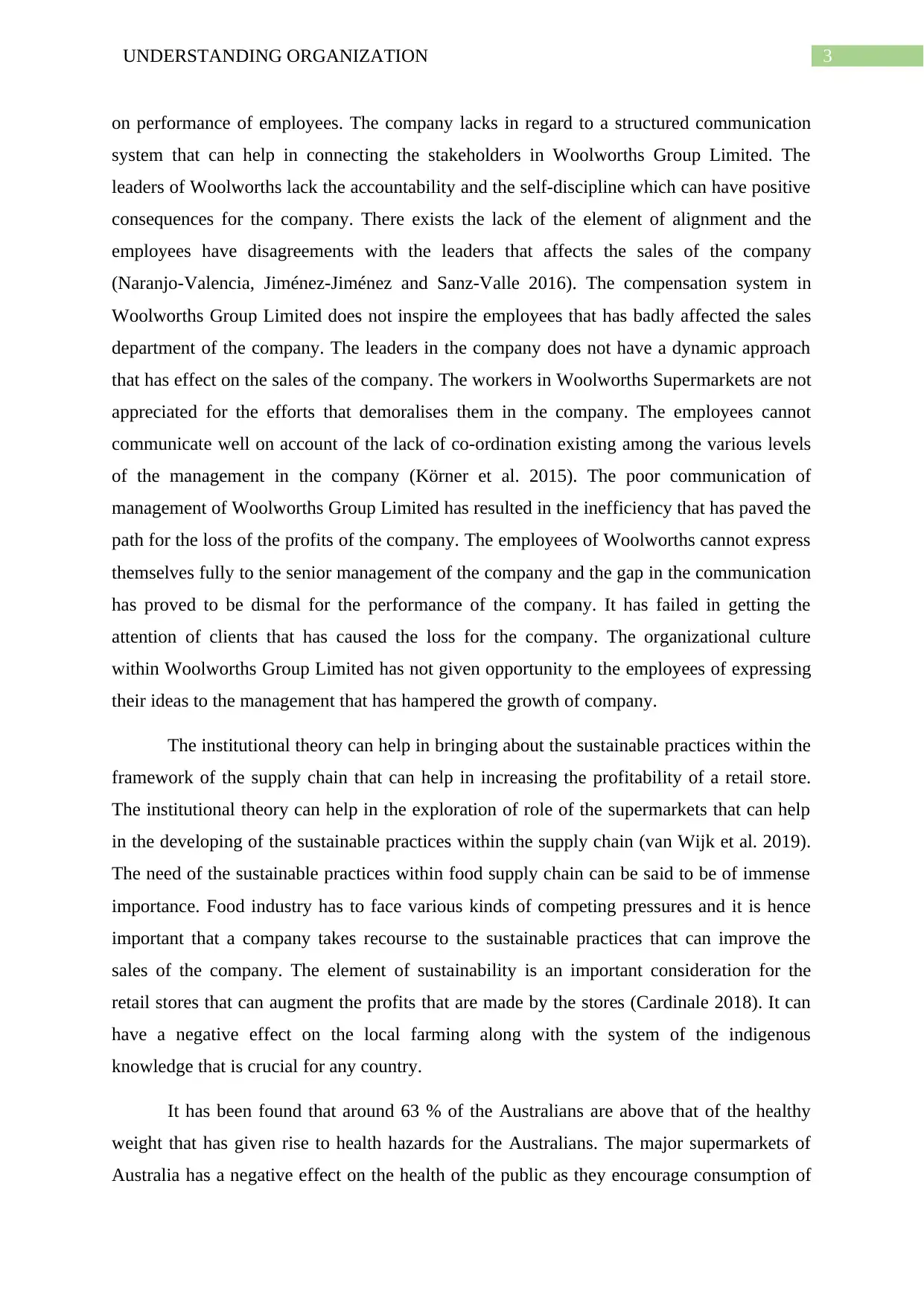
3UNDERSTANDING ORGANIZATION
on performance of employees. The company lacks in regard to a structured communication
system that can help in connecting the stakeholders in Woolworths Group Limited. The
leaders of Woolworths lack the accountability and the self-discipline which can have positive
consequences for the company. There exists the lack of the element of alignment and the
employees have disagreements with the leaders that affects the sales of the company
(Naranjo-Valencia, Jiménez-Jiménez and Sanz-Valle 2016). The compensation system in
Woolworths Group Limited does not inspire the employees that has badly affected the sales
department of the company. The leaders in the company does not have a dynamic approach
that has effect on the sales of the company. The workers in Woolworths Supermarkets are not
appreciated for the efforts that demoralises them in the company. The employees cannot
communicate well on account of the lack of co-ordination existing among the various levels
of the management in the company (Körner et al. 2015). The poor communication of
management of Woolworths Group Limited has resulted in the inefficiency that has paved the
path for the loss of the profits of the company. The employees of Woolworths cannot express
themselves fully to the senior management of the company and the gap in the communication
has proved to be dismal for the performance of the company. It has failed in getting the
attention of clients that has caused the loss for the company. The organizational culture
within Woolworths Group Limited has not given opportunity to the employees of expressing
their ideas to the management that has hampered the growth of company.
The institutional theory can help in bringing about the sustainable practices within the
framework of the supply chain that can help in increasing the profitability of a retail store.
The institutional theory can help in the exploration of role of the supermarkets that can help
in the developing of the sustainable practices within the supply chain (van Wijk et al. 2019).
The need of the sustainable practices within food supply chain can be said to be of immense
importance. Food industry has to face various kinds of competing pressures and it is hence
important that a company takes recourse to the sustainable practices that can improve the
sales of the company. The element of sustainability is an important consideration for the
retail stores that can augment the profits that are made by the stores (Cardinale 2018). It can
have a negative effect on the local farming along with the system of the indigenous
knowledge that is crucial for any country.
It has been found that around 63 % of the Australians are above that of the healthy
weight that has given rise to health hazards for the Australians. The major supermarkets of
Australia has a negative effect on the health of the public as they encourage consumption of
on performance of employees. The company lacks in regard to a structured communication
system that can help in connecting the stakeholders in Woolworths Group Limited. The
leaders of Woolworths lack the accountability and the self-discipline which can have positive
consequences for the company. There exists the lack of the element of alignment and the
employees have disagreements with the leaders that affects the sales of the company
(Naranjo-Valencia, Jiménez-Jiménez and Sanz-Valle 2016). The compensation system in
Woolworths Group Limited does not inspire the employees that has badly affected the sales
department of the company. The leaders in the company does not have a dynamic approach
that has effect on the sales of the company. The workers in Woolworths Supermarkets are not
appreciated for the efforts that demoralises them in the company. The employees cannot
communicate well on account of the lack of co-ordination existing among the various levels
of the management in the company (Körner et al. 2015). The poor communication of
management of Woolworths Group Limited has resulted in the inefficiency that has paved the
path for the loss of the profits of the company. The employees of Woolworths cannot express
themselves fully to the senior management of the company and the gap in the communication
has proved to be dismal for the performance of the company. It has failed in getting the
attention of clients that has caused the loss for the company. The organizational culture
within Woolworths Group Limited has not given opportunity to the employees of expressing
their ideas to the management that has hampered the growth of company.
The institutional theory can help in bringing about the sustainable practices within the
framework of the supply chain that can help in increasing the profitability of a retail store.
The institutional theory can help in the exploration of role of the supermarkets that can help
in the developing of the sustainable practices within the supply chain (van Wijk et al. 2019).
The need of the sustainable practices within food supply chain can be said to be of immense
importance. Food industry has to face various kinds of competing pressures and it is hence
important that a company takes recourse to the sustainable practices that can improve the
sales of the company. The element of sustainability is an important consideration for the
retail stores that can augment the profits that are made by the stores (Cardinale 2018). It can
have a negative effect on the local farming along with the system of the indigenous
knowledge that is crucial for any country.
It has been found that around 63 % of the Australians are above that of the healthy
weight that has given rise to health hazards for the Australians. The major supermarkets of
Australia has a negative effect on the health of the public as they encourage consumption of
Paraphrase This Document
Need a fresh take? Get an instant paraphrase of this document with our AI Paraphraser
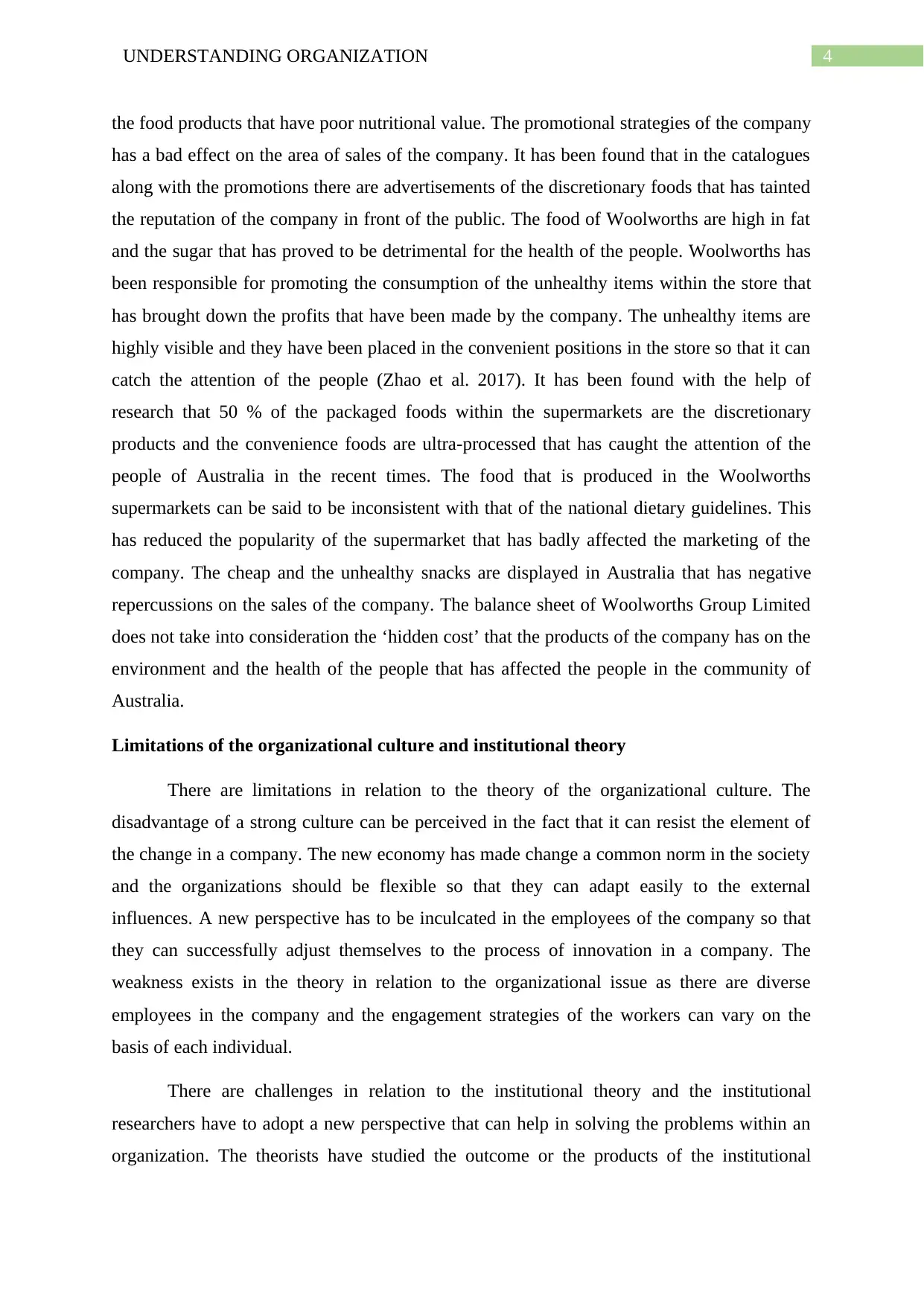
4UNDERSTANDING ORGANIZATION
the food products that have poor nutritional value. The promotional strategies of the company
has a bad effect on the area of sales of the company. It has been found that in the catalogues
along with the promotions there are advertisements of the discretionary foods that has tainted
the reputation of the company in front of the public. The food of Woolworths are high in fat
and the sugar that has proved to be detrimental for the health of the people. Woolworths has
been responsible for promoting the consumption of the unhealthy items within the store that
has brought down the profits that have been made by the company. The unhealthy items are
highly visible and they have been placed in the convenient positions in the store so that it can
catch the attention of the people (Zhao et al. 2017). It has been found with the help of
research that 50 % of the packaged foods within the supermarkets are the discretionary
products and the convenience foods are ultra-processed that has caught the attention of the
people of Australia in the recent times. The food that is produced in the Woolworths
supermarkets can be said to be inconsistent with that of the national dietary guidelines. This
has reduced the popularity of the supermarket that has badly affected the marketing of the
company. The cheap and the unhealthy snacks are displayed in Australia that has negative
repercussions on the sales of the company. The balance sheet of Woolworths Group Limited
does not take into consideration the ‘hidden cost’ that the products of the company has on the
environment and the health of the people that has affected the people in the community of
Australia.
Limitations of the organizational culture and institutional theory
There are limitations in relation to the theory of the organizational culture. The
disadvantage of a strong culture can be perceived in the fact that it can resist the element of
the change in a company. The new economy has made change a common norm in the society
and the organizations should be flexible so that they can adapt easily to the external
influences. A new perspective has to be inculcated in the employees of the company so that
they can successfully adjust themselves to the process of innovation in a company. The
weakness exists in the theory in relation to the organizational issue as there are diverse
employees in the company and the engagement strategies of the workers can vary on the
basis of each individual.
There are challenges in relation to the institutional theory and the institutional
researchers have to adopt a new perspective that can help in solving the problems within an
organization. The theorists have studied the outcome or the products of the institutional
the food products that have poor nutritional value. The promotional strategies of the company
has a bad effect on the area of sales of the company. It has been found that in the catalogues
along with the promotions there are advertisements of the discretionary foods that has tainted
the reputation of the company in front of the public. The food of Woolworths are high in fat
and the sugar that has proved to be detrimental for the health of the people. Woolworths has
been responsible for promoting the consumption of the unhealthy items within the store that
has brought down the profits that have been made by the company. The unhealthy items are
highly visible and they have been placed in the convenient positions in the store so that it can
catch the attention of the people (Zhao et al. 2017). It has been found with the help of
research that 50 % of the packaged foods within the supermarkets are the discretionary
products and the convenience foods are ultra-processed that has caught the attention of the
people of Australia in the recent times. The food that is produced in the Woolworths
supermarkets can be said to be inconsistent with that of the national dietary guidelines. This
has reduced the popularity of the supermarket that has badly affected the marketing of the
company. The cheap and the unhealthy snacks are displayed in Australia that has negative
repercussions on the sales of the company. The balance sheet of Woolworths Group Limited
does not take into consideration the ‘hidden cost’ that the products of the company has on the
environment and the health of the people that has affected the people in the community of
Australia.
Limitations of the organizational culture and institutional theory
There are limitations in relation to the theory of the organizational culture. The
disadvantage of a strong culture can be perceived in the fact that it can resist the element of
the change in a company. The new economy has made change a common norm in the society
and the organizations should be flexible so that they can adapt easily to the external
influences. A new perspective has to be inculcated in the employees of the company so that
they can successfully adjust themselves to the process of innovation in a company. The
weakness exists in the theory in relation to the organizational issue as there are diverse
employees in the company and the engagement strategies of the workers can vary on the
basis of each individual.
There are challenges in relation to the institutional theory and the institutional
researchers have to adopt a new perspective that can help in solving the problems within an
organization. The theorists have studied the outcome or the products of the institutional
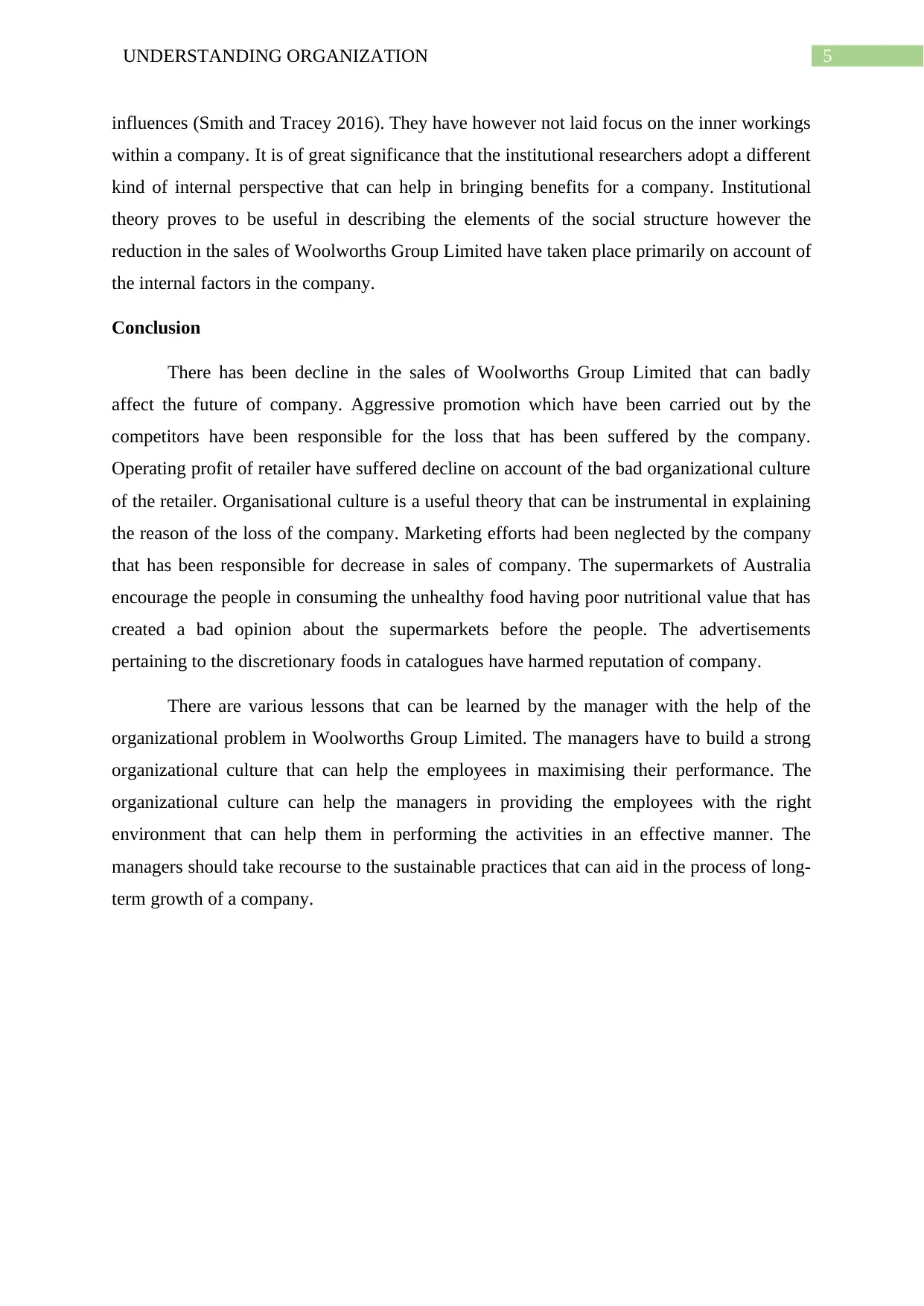
5UNDERSTANDING ORGANIZATION
influences (Smith and Tracey 2016). They have however not laid focus on the inner workings
within a company. It is of great significance that the institutional researchers adopt a different
kind of internal perspective that can help in bringing benefits for a company. Institutional
theory proves to be useful in describing the elements of the social structure however the
reduction in the sales of Woolworths Group Limited have taken place primarily on account of
the internal factors in the company.
Conclusion
There has been decline in the sales of Woolworths Group Limited that can badly
affect the future of company. Aggressive promotion which have been carried out by the
competitors have been responsible for the loss that has been suffered by the company.
Operating profit of retailer have suffered decline on account of the bad organizational culture
of the retailer. Organisational culture is a useful theory that can be instrumental in explaining
the reason of the loss of the company. Marketing efforts had been neglected by the company
that has been responsible for decrease in sales of company. The supermarkets of Australia
encourage the people in consuming the unhealthy food having poor nutritional value that has
created a bad opinion about the supermarkets before the people. The advertisements
pertaining to the discretionary foods in catalogues have harmed reputation of company.
There are various lessons that can be learned by the manager with the help of the
organizational problem in Woolworths Group Limited. The managers have to build a strong
organizational culture that can help the employees in maximising their performance. The
organizational culture can help the managers in providing the employees with the right
environment that can help them in performing the activities in an effective manner. The
managers should take recourse to the sustainable practices that can aid in the process of long-
term growth of a company.
influences (Smith and Tracey 2016). They have however not laid focus on the inner workings
within a company. It is of great significance that the institutional researchers adopt a different
kind of internal perspective that can help in bringing benefits for a company. Institutional
theory proves to be useful in describing the elements of the social structure however the
reduction in the sales of Woolworths Group Limited have taken place primarily on account of
the internal factors in the company.
Conclusion
There has been decline in the sales of Woolworths Group Limited that can badly
affect the future of company. Aggressive promotion which have been carried out by the
competitors have been responsible for the loss that has been suffered by the company.
Operating profit of retailer have suffered decline on account of the bad organizational culture
of the retailer. Organisational culture is a useful theory that can be instrumental in explaining
the reason of the loss of the company. Marketing efforts had been neglected by the company
that has been responsible for decrease in sales of company. The supermarkets of Australia
encourage the people in consuming the unhealthy food having poor nutritional value that has
created a bad opinion about the supermarkets before the people. The advertisements
pertaining to the discretionary foods in catalogues have harmed reputation of company.
There are various lessons that can be learned by the manager with the help of the
organizational problem in Woolworths Group Limited. The managers have to build a strong
organizational culture that can help the employees in maximising their performance. The
organizational culture can help the managers in providing the employees with the right
environment that can help them in performing the activities in an effective manner. The
managers should take recourse to the sustainable practices that can aid in the process of long-
term growth of a company.
⊘ This is a preview!⊘
Do you want full access?
Subscribe today to unlock all pages.

Trusted by 1+ million students worldwide
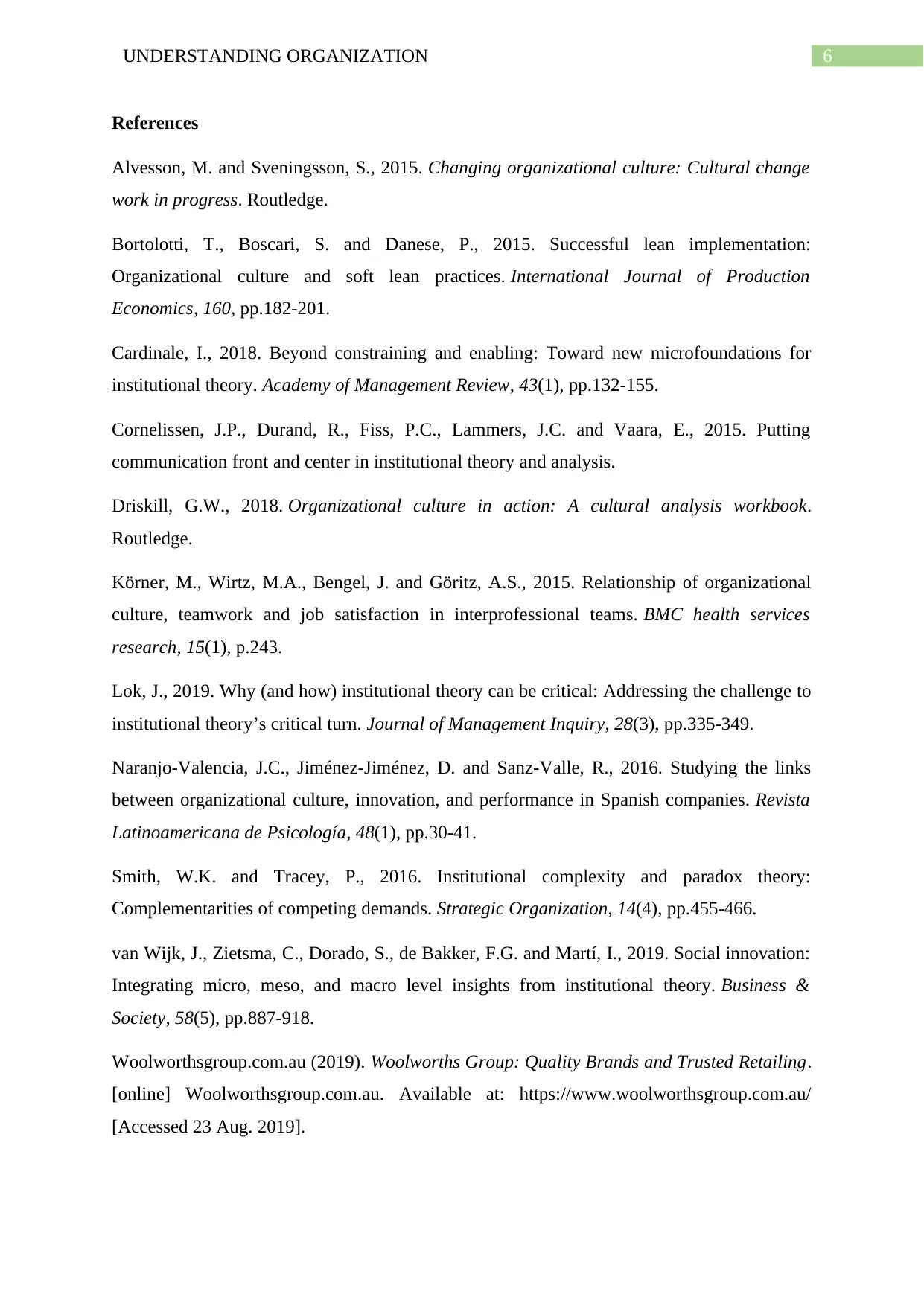
6UNDERSTANDING ORGANIZATION
References
Alvesson, M. and Sveningsson, S., 2015. Changing organizational culture: Cultural change
work in progress. Routledge.
Bortolotti, T., Boscari, S. and Danese, P., 2015. Successful lean implementation:
Organizational culture and soft lean practices. International Journal of Production
Economics, 160, pp.182-201.
Cardinale, I., 2018. Beyond constraining and enabling: Toward new microfoundations for
institutional theory. Academy of Management Review, 43(1), pp.132-155.
Cornelissen, J.P., Durand, R., Fiss, P.C., Lammers, J.C. and Vaara, E., 2015. Putting
communication front and center in institutional theory and analysis.
Driskill, G.W., 2018. Organizational culture in action: A cultural analysis workbook.
Routledge.
Körner, M., Wirtz, M.A., Bengel, J. and Göritz, A.S., 2015. Relationship of organizational
culture, teamwork and job satisfaction in interprofessional teams. BMC health services
research, 15(1), p.243.
Lok, J., 2019. Why (and how) institutional theory can be critical: Addressing the challenge to
institutional theory’s critical turn. Journal of Management Inquiry, 28(3), pp.335-349.
Naranjo-Valencia, J.C., Jiménez-Jiménez, D. and Sanz-Valle, R., 2016. Studying the links
between organizational culture, innovation, and performance in Spanish companies. Revista
Latinoamericana de Psicología, 48(1), pp.30-41.
Smith, W.K. and Tracey, P., 2016. Institutional complexity and paradox theory:
Complementarities of competing demands. Strategic Organization, 14(4), pp.455-466.
van Wijk, J., Zietsma, C., Dorado, S., de Bakker, F.G. and Martí, I., 2019. Social innovation:
Integrating micro, meso, and macro level insights from institutional theory. Business &
Society, 58(5), pp.887-918.
Woolworthsgroup.com.au (2019). Woolworths Group: Quality Brands and Trusted Retailing.
[online] Woolworthsgroup.com.au. Available at: https://www.woolworthsgroup.com.au/
[Accessed 23 Aug. 2019].
References
Alvesson, M. and Sveningsson, S., 2015. Changing organizational culture: Cultural change
work in progress. Routledge.
Bortolotti, T., Boscari, S. and Danese, P., 2015. Successful lean implementation:
Organizational culture and soft lean practices. International Journal of Production
Economics, 160, pp.182-201.
Cardinale, I., 2018. Beyond constraining and enabling: Toward new microfoundations for
institutional theory. Academy of Management Review, 43(1), pp.132-155.
Cornelissen, J.P., Durand, R., Fiss, P.C., Lammers, J.C. and Vaara, E., 2015. Putting
communication front and center in institutional theory and analysis.
Driskill, G.W., 2018. Organizational culture in action: A cultural analysis workbook.
Routledge.
Körner, M., Wirtz, M.A., Bengel, J. and Göritz, A.S., 2015. Relationship of organizational
culture, teamwork and job satisfaction in interprofessional teams. BMC health services
research, 15(1), p.243.
Lok, J., 2019. Why (and how) institutional theory can be critical: Addressing the challenge to
institutional theory’s critical turn. Journal of Management Inquiry, 28(3), pp.335-349.
Naranjo-Valencia, J.C., Jiménez-Jiménez, D. and Sanz-Valle, R., 2016. Studying the links
between organizational culture, innovation, and performance in Spanish companies. Revista
Latinoamericana de Psicología, 48(1), pp.30-41.
Smith, W.K. and Tracey, P., 2016. Institutional complexity and paradox theory:
Complementarities of competing demands. Strategic Organization, 14(4), pp.455-466.
van Wijk, J., Zietsma, C., Dorado, S., de Bakker, F.G. and Martí, I., 2019. Social innovation:
Integrating micro, meso, and macro level insights from institutional theory. Business &
Society, 58(5), pp.887-918.
Woolworthsgroup.com.au (2019). Woolworths Group: Quality Brands and Trusted Retailing.
[online] Woolworthsgroup.com.au. Available at: https://www.woolworthsgroup.com.au/
[Accessed 23 Aug. 2019].
Paraphrase This Document
Need a fresh take? Get an instant paraphrase of this document with our AI Paraphraser
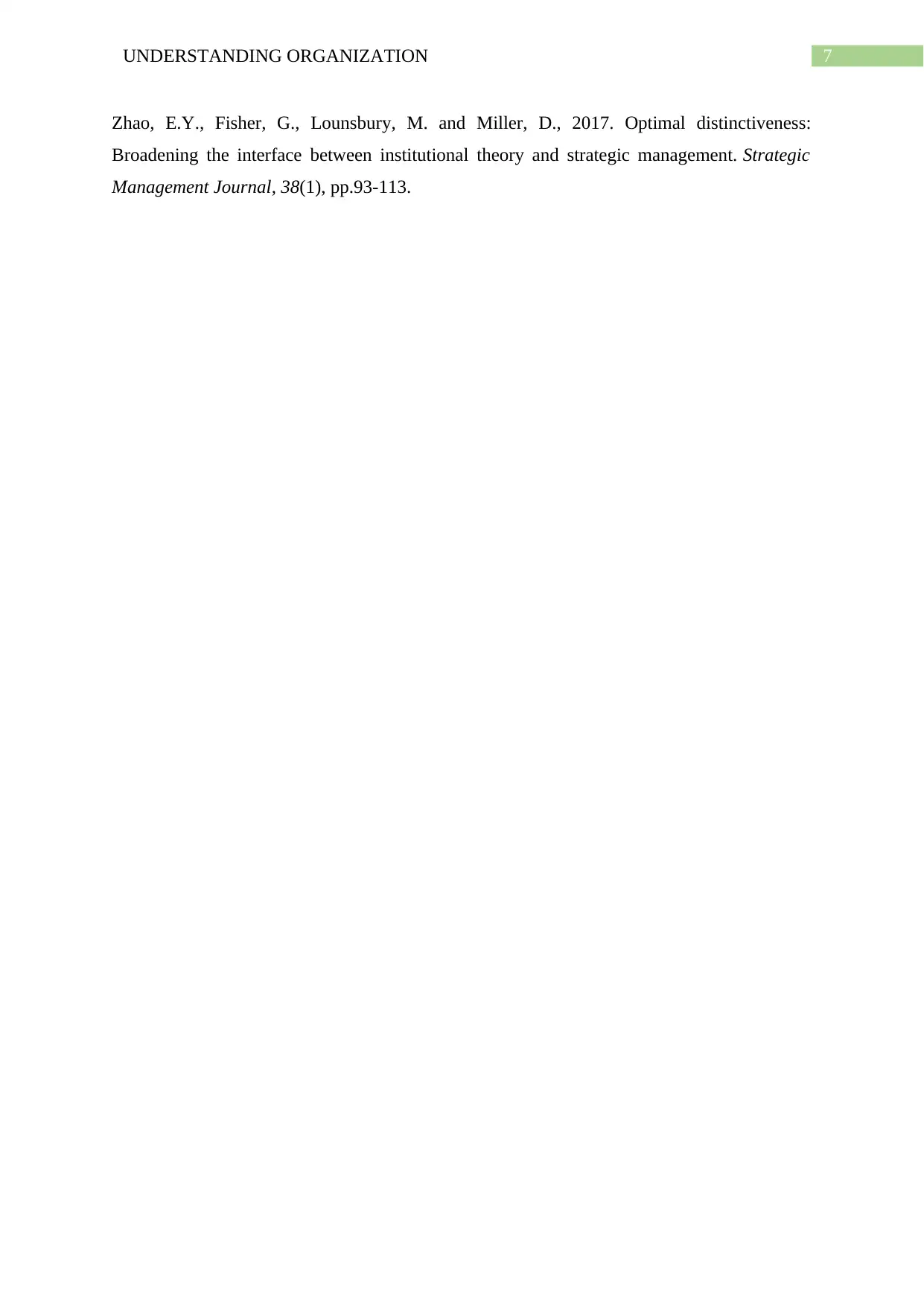
7UNDERSTANDING ORGANIZATION
Zhao, E.Y., Fisher, G., Lounsbury, M. and Miller, D., 2017. Optimal distinctiveness:
Broadening the interface between institutional theory and strategic management. Strategic
Management Journal, 38(1), pp.93-113.
Zhao, E.Y., Fisher, G., Lounsbury, M. and Miller, D., 2017. Optimal distinctiveness:
Broadening the interface between institutional theory and strategic management. Strategic
Management Journal, 38(1), pp.93-113.
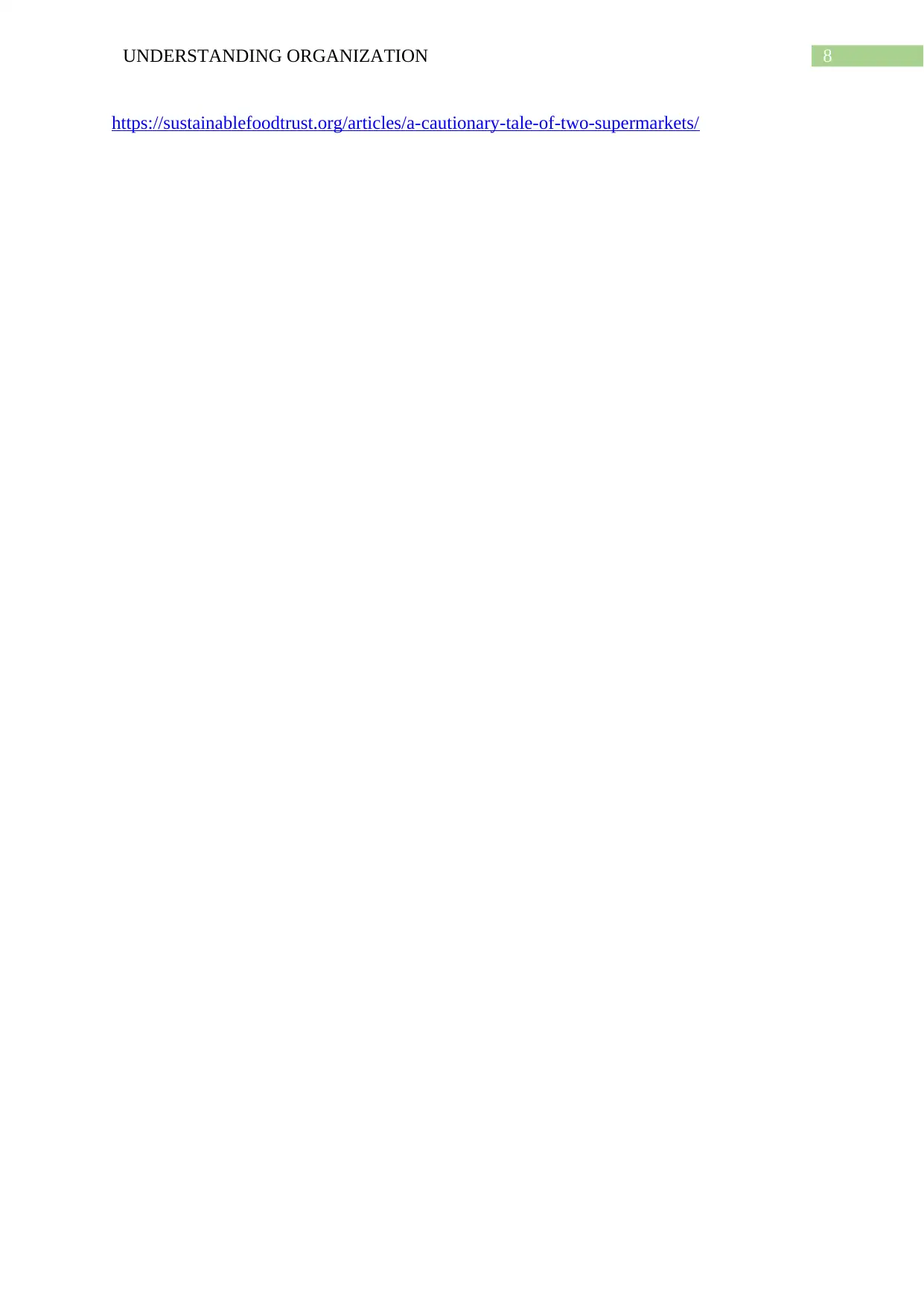
8UNDERSTANDING ORGANIZATION
https://sustainablefoodtrust.org/articles/a-cautionary-tale-of-two-supermarkets/
https://sustainablefoodtrust.org/articles/a-cautionary-tale-of-two-supermarkets/
⊘ This is a preview!⊘
Do you want full access?
Subscribe today to unlock all pages.

Trusted by 1+ million students worldwide
1 out of 9
Related Documents
Your All-in-One AI-Powered Toolkit for Academic Success.
+13062052269
info@desklib.com
Available 24*7 on WhatsApp / Email
![[object Object]](/_next/static/media/star-bottom.7253800d.svg)
Unlock your academic potential
Copyright © 2020–2026 A2Z Services. All Rights Reserved. Developed and managed by ZUCOL.




